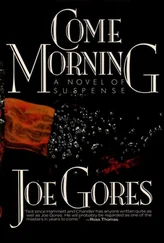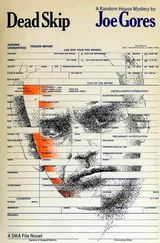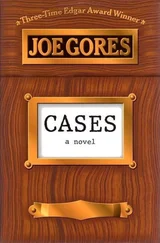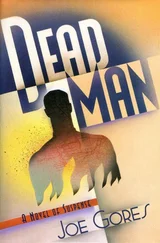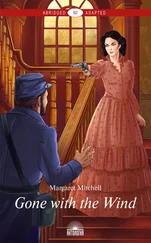Bart Heslip parked and carefully locked his car. Even at two in the afternoon you didn’t leave your car open in the Western Addition. They called Hickory a street, but it was really an alley that ran for six blocks between Oak and Fell. The middle couple of blocks had been pretty badly chewed up when they had put the skyway in years before, but where he was, just off Webster, was residential.
If dilapidated single-car garages and the backs of rundown apartment houses were residential. Ghetto-land, baby. Ninety-nine percent black, so old Redevelopment probably was eying it and licking thin whitey lips. Man, they’s houses there, an’ people, an’ everything. Quick, tear it down.
Old Redevelopment, he liked them empty weedy lots.
His shoe skittered an empty beer can across potholed blacktop. A startled rat dashed from the noise into a garage. Heslip went up sagging wooden stairs to 578 Hickory. The door was unpainted, slicked here and there with spots and splotches of old varnish. Where the bell should have been was a perfectly round hole with a couple of taped-off wires hanging out of it.
The door rattled under his fist as if a little more force would put a knuckle through it. He heard the protesting creak of bedsprings. Something female yelled something unintelligible, then cleared its throat with a long dragging sound like a power mower starting up.
“Johnny Mack sent me, Sally,” he called through the door.
More creaks. A series of grunts. The door was tugged open a foot, and a broad ebony face, almost ferocious in its ugliness, looked out. He could see a fuzzy once-pink robe below it.
“Why that snotty bastid sendin you around?”
“He said you could hip me to where Verna’s at.”
She stared at him for long moments, then finally dragged the door wider. She had small, nasty, bloodshot eyes and a nose flat enough to have been hit with a board. Her mouth was wide and very pink when she opened it. “Well, c’mon in. You look big enough to handle it.”
Heslip had to step around the edge of the once-expensive opened-out hide-a-bed to do it without touching her. A burst of stuffing at one corner suggested a live-in cat or a long-ago stabbing. The place stank of sleep and cheap wine. In one corner was a pile of laundry ripe enough to culture yeast.
“You ain’t interested in no Verna, is you, baby?” she simpered. “You tryna turn me out, ain’t you?”
Heslip sat down at a chrome-and-plastic chair by the breakfast table jammed into a corner of the room. “Verna,” he said flatly.
“Then whut you cornin’ round runnin’ a game on me this time of the mornin’?”
“It’s two in the afternoon.”
“Mornin’ to me.” She jerked a thumb at the door. “You cute, but I ain’t in the mood.”
Heslip laid a $20 bill on the table besides the remains of a pizza someone had used as an ashtray. Sally wet her lips. Somehow the pink robe had fallen open. “I’m gettin in the mood, baby.”
In the dim light he could see the heavy sag of dark-areolaed breasts, the rounded swell of soft gut and the darker pubic triangle between the pastel edges of soiled cloth. They excited him like watching traffic signals change.
“Verna,” he repeated.
Humanity abruptly contorted her face, surprising in its intensity. “Verna ain’t gonna cop no trouble fum you? You swear you ain’t de heat?”
Heslip flicked the $20 bill so it drifted to the floor. Sally looked at it, avarice gleaming in her yellow-balled eyes.
“If I was a pi-i-g, momma,” he said contemptuously, “would I be cornin’ around with no cabbage like this?”
The eyes stared beadily at him for a moment longer, then she stooped and snatched up the bill. Heslip made no move, so she shoved it in the pocket of the robe and went to the closet. She talked as she rummaged. “Knew you wasn’t from no Johnny Mack, not when you started askin’ me bout Verna... She talked him into goin’ back east somewheres to fin’ someone... Sent me this here card...”
She returned with a picture postcard of a church. Heslip checked the postmark for time and city of origin.
“January. New Orleans.” His eyes followed the childish scrawl. Jonny got me a room im workin, this heres a nice town. Aint found still looken. Write, love Verna. He looked up. “Answer it?”
“I been busy,” she said almost defiantly.
“Sure.”
Heslip doubted he would be chasing Verna Rounds anymore. Dan Kearny just wasn’t going to need her that bad. Not all-the-way-to-New-Orleans bad.
Kearny was driving east on York Boulevard in the Eagle Rock area. O’Bannon was beside him, leathery face twisted in concentration over the unfamiliar Los Angeles street map. Kearny turned the LTD into Avenue Fifty and O’B started checking street numbers.
“On the right,” he said.
It was a multi-unit setup with shrubbery and redwood chips and an iron-gated walkway through to an inner court where a couple of tons of weekend-idled flesh broiled around a blue-glinting pool. Kearny twice ran his finger, without success, down the rows of plastic-protected names on the buzzer board beside the gate.
“Landlady is Mrs. Theron Johnson,” said O’B.
Kearny shoved the buzzer and a tinny voice spoke to them from the squawk box. The gate was buzzed open. They found Mrs. Theron Johnson to be a wide-hipped woman in red stretch slacks of the sort that are almost a uniform in certain portions of Los Angeles. She wore horn-rimmed glasses and her hair ten years out of date. “That one? Jeff Simson? Moved out last month owing two weeks back rent. Why do you want him?”
“An insurance matter.”
She stepped out into the empty concrete breezeway. Beyond the decorative greenery, someone hit the pool with a loud splash. Water glinted in the air. People laughed. Mrs. Johnson leaned closer and in a hoarse, furtive whisper said, “Simson, he’s one of those.”
Kearny reared back in amazement. “No!”
“Yes. A young fellow named Tommy Cannacova, lived upstairs in 319, he moved out the same time as Simson. They were awfully close. Of course I’m not sure, but...”
“This Simson, no forwarding on him?” asked O’B.
“Like I said, he stuck me with two weeks’ rent. Of course I had a security deposit and all, but...”
“Cannacova?”
“He didn’t move owing, but no forwar...” She interrupted herself. “Say, I do believe my boy Alfie used to deliver the morning paper to that Cannacova boy’s mother when he had his route. She was remarried, had a different name, but...”
Alfie Johnson was a tow-headed thirteen, tall and rangy and betraying his youth by a still high-pitched voice and an Adam’s apple that jumped nervously as he talked. He had the standard California public school mumble which swallowed so many word endings that it was almost a speech impediment. “Sure, uh, Tommy Cannacova, uh, sure...”
He couldn’t remember the mother’s remarried name, or the address, but after two Big Macs and half an hour of cruising the streets around Occidental College he pointed a youth-grimy finger. “That one. With the brown trim.”
It was a small bungalow set back from the street behind a green postage stamp of lawn as meticulously barbered as a TV personality. The windows were down on the five-year-old Duster in the driveway, so Kearny reached in and flipped open the glove box for a long few moments. He slammed it shut and straightened.
“Paul and Zelma deSouza.”
The front door opened and an overweight boy with braces on his teeth stood looking at them as they came up. “You from the finance company?”
“Just get your ma,” said Kearny. The house was small enough for them to have to speak over the noise of a vacuum sweeper inside.
Читать дальше
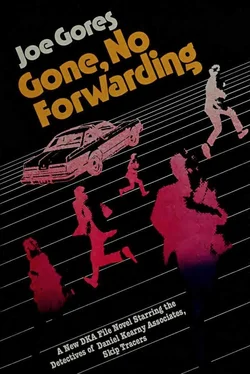


![Эрик Рассел - Подарок дядюшки Джо [=Подарок от Джо] (ёфицировано)](/books/65161/erik-rassel-podarok-dyadyushki-dzho-podarok-ot-dzho-thumb.webp)



